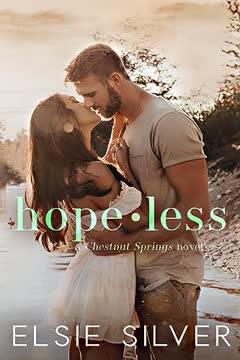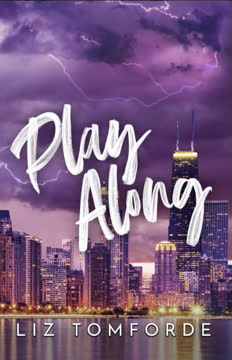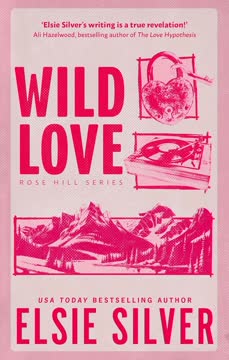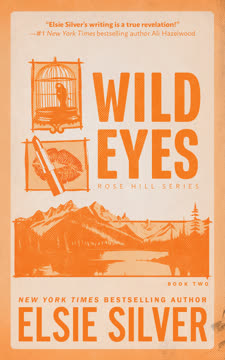Plot Summary
Prologue: A Summer of Watching
In 2002, six-year-old Lucie is left at her great-aunt Ruth's lakeside cottage, feeling unwanted and invisible. From her window, she watches the carefree boys next door, especially one—Caleb—who seems to embody everything she lacks: freedom, belonging, and joy. Lucie, used to being a secret and a burden, dreams of saving him one day, like a storybook heroine. This early, unspoken connection plants the seed for a lifelong longing, shaping Lucie's sense of self and her belief that she is destined for something more, even as she learns to survive in the shadows of other people's lives.
Return to Elliott Springs
Twenty years later, Lucie returns to Elliott Springs, now a mother of twins and on the verge of divorce from her cruel, cheating husband, Jeremy. She seeks refuge in her inherited cottage, hoping to rebuild her life and give her children the stability she never had. The lake, the dock, and the memories of Caleb linger in her mind, representing both the innocence she lost and the hope she still clings to. As she takes a literal plunge into the cold lake, Lucie marks the beginning of her journey toward freedom, self-worth, and the possibility of a new life.
The Boy Next Door
Lucie's new job at a tech company brings an unexpected shock: her boss is Caleb, the boy from her childhood dreams. Now a guarded, work-obsessed CEO, Caleb is skeptical of Lucie's role and her ability to make a difference. Their reunion is awkward, charged with unspoken history and mutual surprise. Both are changed by time and pain, but the old connection flickers beneath the surface. Lucie's presence unsettles Caleb, while she is forced to confront the reality behind her fantasies. Their professional and personal lives become entangled, setting the stage for conflict and possibility.
A Job, A Chance
Lucie's job is on the line from day one, as Caleb makes it clear her position is temporary and likely doomed. With two children to support and nowhere else to turn, Lucie scrambles to prove herself, drawing on the resilience and resourcefulness she learned from her aunt. She launches a walking program to boost employee morale, facing skepticism and resistance from Caleb and others. The challenge forces Lucie to confront her own insecurities and to fight for a place in a world that has always seemed to reject her. The stakes are high—not just for her career, but for her sense of self.
Old Wounds, New Boss
As Lucie and Caleb navigate their new working relationship, old wounds resurface. Caleb's cynicism masks deeper pain, while Lucie's optimism is tested by setbacks at work and at home. Their interactions are fraught with misunderstanding, attraction, and the weight of their pasts. Lucie's struggles as a single mother and her fraught relationship with her own parents mirror Caleb's unresolved grief and guilt. Small moments of kindness and connection begin to break through their defenses, hinting at the possibility of healing and change, even as both resist vulnerability.
Divorce and Defiance
Lucie's divorce from Jeremy becomes a battleground, with financial sabotage, emotional abuse, and threats to her children's well-being. Jeremy's manipulations force Lucie to confront her deepest fears about failure and motherhood. With the help of friends and a new lawyer, she begins to reclaim her agency, refusing to be defined by her ex-husband's cruelty. The struggle is exhausting and isolating, but Lucie's determination to protect her children and build a better life grows stronger. Her journey becomes not just about survival, but about redefining what she deserves.
The Walking Program Gamble
Lucie's walking program, initially dismissed by Caleb, gains traction and brings unexpected energy to the company. As employees engage and morale improves, Lucie earns respect and a sense of accomplishment. Caleb, forced to acknowledge her impact, begins to see her in a new light. Their professional dynamic shifts, blending challenge with admiration. The program's success becomes a metaphor for Lucie's own journey: incremental steps, persistence, and the courage to try, even when the outcome is uncertain. Each small win builds her confidence and chips away at old patterns of self-doubt.
Children, Challenges, and Change
Lucie's struggles as a mother intensify, especially as her son Henry faces social and academic challenges. The pressure to be perfect, the fear of failing her children, and the echoes of her own childhood trauma weigh heavily. Caleb's unexpected rapport with Henry offers hope and complicates Lucie's feelings. The children become both a source of vulnerability and a catalyst for change, forcing Lucie to confront her limitations and to accept help. The evolving relationships between Lucie, her children, and Caleb reveal the messy, beautiful complexity of family and the possibility of new beginnings.
The Past Resurfaces
The ghosts of Lucie's and Caleb's pasts return in unexpected ways. Lucie's estranged father, a powerful tech mogul, continues to deny her existence, while her mother's criticism and Jeremy's threats intensify. Caleb's unresolved grief over the loss of his infant daughter and the collapse of his marriage to Kate haunt him, shaping his reluctance to commit. When Kate reappears, the past collides with the present, forcing both Lucie and Caleb to reckon with old wounds, unfinished business, and the question of what—and who—they truly want.
Sparks and Setbacks
The simmering attraction between Lucie and Caleb becomes impossible to ignore, leading to moments of intimacy, longing, and confusion. Both are drawn to each other but held back by fear, guilt, and the baggage of their histories. Professional boundaries blur, and the risk of scandal looms. As they inch closer, external pressures—work, family, and the specter of Caleb's marriage—threaten to pull them apart. Their connection is electric but fraught, offering both the promise of healing and the danger of heartbreak.
The Fairy Tale Myth
Lucie's lifelong belief in fairy tales and happy endings is tested as her relationship with Caleb deepens and unravels. The fantasy of rescue and perfect love collides with the messy, painful reality of adult life. Both Lucie and Caleb must confront the stories they've told themselves—about love, worth, and destiny—and decide whether to cling to old myths or forge a new path. The collapse of illusions is both devastating and liberating, opening the door to a more honest, imperfect, and authentic connection.
Family, Failure, Forgiveness
Caleb's struggle with guilt over his daughter's death and his failed marriage reaches a breaking point. Lucie, too, must face her own patterns of self-blame and the fear of repeating her parents' mistakes. Their journeys toward forgiveness—of themselves and each other—are painful and nonlinear. The process requires honesty, vulnerability, and the willingness to accept imperfection. As they begin to forgive themselves, they become capable of offering real love and support to each other and to the children who depend on them.
The Breaking Point
A crisis with Henry—his disappearance and the terror of potential loss—forces Lucie and Caleb to confront what truly matters. The ordeal exposes the fragility of life, the limits of control, and the depth of their feelings. In the aftermath, Lucie realizes she cannot continue to wait for someone who is unwilling or unable to choose her and her children fully. She makes the painful decision to let go, prioritizing her children's safety and well-being over her own longing. Caleb, left alone, is forced to reckon with the consequences of his avoidance and fear.
Lost and Found
Caleb's journey through grief and guilt leads him to confront his past, visit his daughter's grave, and finally acknowledge the depth of his love for Lucie and her children. Meanwhile, Lucie faces the reality of moving on, finding strength in her children and her own resilience. Both are changed by loss and the recognition that love requires risk, responsibility, and the willingness to be present, even when it hurts. The possibility of reconciliation emerges, but only if both are willing to be brave.
Facing the Truth
Caleb returns, ready to put Lucie and her children first, and confesses his love. Lucie, inspired by her son's bravery, finds the courage to be vulnerable and to accept the love she has always wanted. Together, they face the challenges of blending their lives, navigating the complexities of family, work, and healing. The reunion is hard-won, built on honesty, forgiveness, and the shared commitment to try, even when the outcome is uncertain. The fairy tale is replaced by something real, imperfect, and enduring.
Letting Go, Holding On
As Lucie and Caleb build a life together, they confront lingering doubts, external obstacles, and the ongoing challenges of parenting, work, and love. The process is messy and sometimes painful, but marked by growth, laughter, and the deepening of trust. The past is not erased, but integrated, becoming a source of wisdom rather than pain. Together, they learn that love is not about rescue or perfection, but about showing up, holding on, and choosing each other every day.
The Choice to Stay
With the merger behind them and the ghosts of the past laid to rest, Lucie and Caleb choose to build a home and a family together. They navigate the realities of blended family life, the challenges of raising neurodiverse children, and the ongoing work of partnership. Their love is tested but endures, grounded in mutual respect, shared values, and the willingness to keep trying. The story ends not with a fairy tale, but with the promise of a life built on courage, honesty, and the choice to stay.
A New Beginning
In the final chapter, Lucie and Caleb, surrounded by their children and friends, embrace the messy, beautiful reality of their new life. The journey from loneliness and longing to love and belonging is complete—not because everything is perfect, but because they have learned to face imperfection together. The summer that began with loss and uncertainty ends with hope, laughter, and the knowledge that they have saved each other, not by magic, but by choosing to love, forgive, and begin again.
Characters
Lucie Monroe
Lucie is the emotional heart of the story—a woman shaped by childhood neglect, parental rejection, and a lifetime of being a secret or an afterthought. Her journey is one of reclaiming agency, self-worth, and the right to be loved openly. As a mother, she is fiercely protective, determined to give her twins the stability and acceptance she never had. Lucie's psychological landscape is marked by deep-seated fears of abandonment and failure, but also by hope, humor, and a stubborn refusal to give up. Her relationship with Caleb is both a fulfillment of childhood longing and a test of her ability to demand more for herself and her children. Over the course of the novel, Lucie transforms from a woman defined by others' choices to one who makes her own, learning that true love is not about rescue, but about partnership, honesty, and the courage to stay.
Caleb Lowell
Caleb is a man haunted by loss, guilt, and the weight of responsibility. Once the golden boy of Elliott Springs, he is now a guarded, workaholic CEO, scarred by the death of his infant daughter and the collapse of his marriage to Kate. His psychological armor is thick—cynicism, control, and emotional distance—but beneath it lies a longing for connection and redemption. Caleb's journey is one of confronting his own failures, forgiving himself, and learning to risk love again. His relationship with Lucie and her children challenges his self-image and forces him to choose between safety and vulnerability. Caleb's development is marked by moments of tenderness, fear, and ultimately, the willingness to put others first. He becomes not just Lucie's partner, but a father figure to her children, finding healing in the messy, imperfect reality of family.
Jeremy Boudreau
Jeremy is Lucie's ex-husband and the primary source of external conflict. Charming on the surface but deeply cruel and controlling, he uses financial, emotional, and psychological abuse to maintain power over Lucie and their children. Jeremy's actions—sabotaging Lucie's finances, undermining her confidence, and threatening custody—reflect a profound insecurity and need for dominance. He represents the toxic legacy of Lucie's past and the societal forces that punish women for seeking independence. Jeremy's presence forces Lucie to confront her fears and to fight for her own and her children's freedom.
Henry Monroe
Henry, Lucie's son, is a quiet, introspective boy who struggles with social and academic challenges. His journey mirrors Lucie's in many ways—marked by a longing for acceptance, fear of failure, and the need for a safe, loving environment. Henry's connection with Caleb becomes a catalyst for growth and healing, both for himself and for the adults around him. His struggles highlight the importance of patience, understanding, and unconditional love in parenting and family life.
Sophie Monroe
Sophie, Lucie's daughter, is the opposite of her brother—outgoing, assertive, and quick-witted. She provides comic relief and emotional grounding, often acting as a bridge between Lucie and Henry. Sophie's resilience and self-assurance are both a source of strength and a reminder of what Lucie hopes to give her children: the freedom to be themselves, loved and accepted.
Kate Lowell
Kate is Caleb's estranged wife, whose struggles with addiction and loss cast a long shadow over the story. Her reappearance forces Caleb to confront his past and the unfinished business of grief, guilt, and forgiveness. Kate is both a rival and a mirror for Lucie, embodying the dangers of avoidance and the cost of unhealed wounds. Her presence complicates the central romance and raises questions about loyalty, responsibility, and the possibility of second chances.
Molly
Molly is Lucie's best friend and confidante, providing support, comic relief, and practical advice throughout the story. As a successful, independent woman, she models resilience and self-respect, encouraging Lucie to demand more from life and love. Molly's own romantic subplot adds depth and contrast, highlighting the different ways women navigate love, work, and self-worth.
Mark Spencer
Mark is Lucie's initial advocate at work, offering encouragement and practical support. He represents the possibility of kindness and fairness in a professional world often marked by competition and cynicism. Mark's role is to facilitate Lucie's growth and to provide a counterpoint to Caleb's initial resistance.
Harrison
Harrison is Caleb's longtime friend and legal advisor, offering both practical help and emotional insight. He pushes Caleb to confront his fears, take responsibility, and fight for what matters. Harrison's own struggles with family and relationships add nuance to the story's exploration of love, loyalty, and the difficulty of change.
Beck
Beck is part of Caleb's circle of friends, marked by loyalty, strength, and a quiet understanding of pain. His presence provides stability and perspective, and his own backstory hints at future stories of healing and redemption. Beck's role is to challenge, support, and sometimes provoke Caleb, helping him see what he cannot see for himself.
Plot Devices
Dual Timelines and Perspectives
The novel employs a dual timeline structure, moving between Lucie's childhood and her adult life, as well as alternating perspectives between Lucie and Caleb. This device allows the reader to understand the roots of their longing, pain, and hope, and to witness the slow, often painful process of growth and change. The shifting viewpoints create dramatic irony, tension, and empathy, as the reader sees how each character's fears and desires shape their actions.
Symbolism of the Lake and the Dock
The lake and the dock serve as central symbols throughout the novel, representing freedom, longing, and the possibility of rescue. For Lucie, the dock is a place of watching, hoping, and dreaming; for Caleb, it is a site of both joy and loss. The recurring imagery of water, swimming, and rescue underscores the themes of vulnerability, risk, and the need for connection.
The Fairy Tale Motif
Lucie's belief in fairy tales and happy endings is a recurring motif, used to explore the tension between fantasy and reality. The novel subverts traditional romance tropes, showing that true love is not about rescue or perfection, but about honesty, effort, and the willingness to stay. The motif is both a source of comfort and a challenge, forcing the characters to confront the stories they tell themselves and to choose a more authentic, if messier, path.
Foreshadowing and Parallelism
The narrative is rich with foreshadowing—early references to rescue, loss, and the dangers of avoidance anticipate later crises and turning points. The parallel journeys of Lucie and Caleb—both shaped by childhood wounds, both seeking belonging—create a sense of inevitability and symmetry. The reappearance of old characters and unresolved conflicts heightens tension and deepens the emotional stakes.
The Walking Program and Workplace Dynamics
The walking program, initially a simple workplace initiative, becomes a metaphor for Lucie's journey: progress through small steps, persistence in the face of resistance, and the importance of community. The workplace setting allows for exploration of themes of belonging, recognition, and the struggle to be seen and valued.
Crisis and Catharsis
Key plot points—Henry's disappearance, the confrontation with Lucie's father, the reappearance of Kate—serve as moments of crisis that force the characters to confront their deepest fears and desires. These events strip away illusions, reveal true priorities, and create the conditions for catharsis, forgiveness, and new beginnings.
Analysis
Elizabeth O'Roark's The Summer I Saved You is a nuanced, emotionally resonant exploration of love, loss, and the long, hard work of healing. At its core, the novel is about the courage to choose oneself and one's family, even when the world has taught you to expect rejection. Through Lucie and Caleb's intertwined journeys, the story deconstructs the myth of the fairy tale romance, replacing it with a vision of love that is honest, imperfect, and hard-won. The novel's strength lies in its psychological depth—the way it traces the impact of childhood wounds, the legacy of trauma, and the slow, nonlinear process of forgiveness. By centering the experiences of a single mother, a neurodiverse child, and a man haunted by grief, O'Roark challenges traditional romance tropes and offers a more inclusive, realistic vision of family and partnership. The book's message is clear: true love is not about rescue or perfection, but about the willingness to show up, to try, and to stay, even when it's hard. In a world that often punishes vulnerability, The Summer I Saved You is a testament to the power of hope, the necessity of boundaries, and the possibility of beginning again.
Last updated:
Review Summary
The Summer I Saved You received mixed reviews, with ratings ranging from 1 to 5 stars. Many readers enjoyed the chemistry between the main characters, Lucie and Caleb, and praised the author's writing style. However, some found Caleb's character development lacking and criticized the rushed ending. The book explores themes of single parenthood, workplace romance, and overcoming past traumas. While some readers found it less angsty than the previous book in the series, others appreciated the emotional depth and character growth.



















